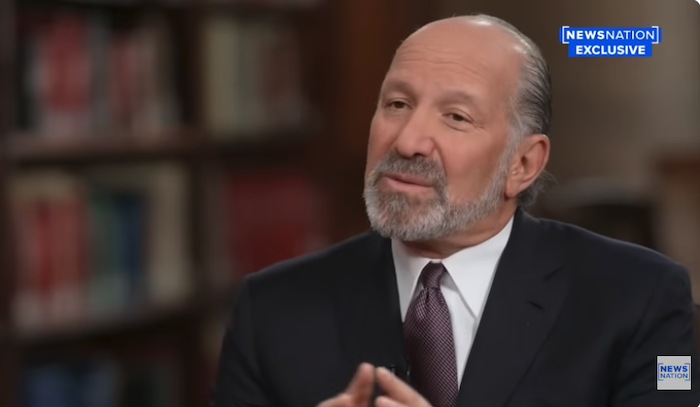US Commerce Secretary Howard Lutnick has given a frank update on trade negotiations with Taiwan, saying the Trump Administration wants a far greater proportion of the advanced computer chips sold in the US made in America – not “9,000 miles away” on an island that China is threatening to take over.
Lutnick said America was producing only “2% of the chips that we need” and that his goal was to raise that figure to at least 40% over his time in office by convincing Taipei and all the companies in its chip supply chain that they need to set up facilities in America, so it can protect them.
“The thing about Taiwan is they make, like, 95% of chips that we put in our phones, we put in our cars .. they make 95% of our chips, [but] are made 9,000 miles away. That doesn’t sound good. And by the way, it’s 80 miles from mainland China.. and the Chinese have said ‘We’re gonna take Taiwan.’ Like, they’re not even shy about it.
ALSO SEE: China’s Manufacturing Slump Drags on Amid US Trade Uncertainty
“So, this is an issue. And .. my objective and this administration’s objective, is to get chip manufacturing significantly onshore [in the US]. We need to make our own chips… If you can’t make your own chips, how can you defend yourself?” Lutnick said in an interview with NewsNation on Sunday (Sept 28).
“In the trade world, it’s called the Silicon Shield, like we need their silicon – their chips – so badly, that we’ll shield them, we’ll protect them,” he said.
“So my argument to them was ‘Well, if you have 95% [of production], how am I going to get it to protect you?’ .. We need enough production, so the idea that I pitched them was ‘Let’s get to 50/50 – we’re producing half and you’re producing half.
“We’re still fundamentally reliant upon you, because you know we can’t live without the other half. But if we have half, we have the capacity to do what we need to do, if we need to do it.”
Lutnick said the transfer of technology was a “herculean” task that would cost a vast sum, but AI companies and chipmakers were now regularly discussing projects worth hundreds of billions of dollars.
“Everybody tells me it’s impossible; it would require investment in America north of $500 billion, and we’d have to get everybody out – you’d have to get the whole supply chain .. so we’re gonna bring the whole supply chain in. And that’s my objective.
“I think having Taiwan participate, and agree to participate, that is the magic of the Trump administration, of Donald Trump, cos he can bring people to say ‘All right, if that’s your goal, I’ll help you achieve your goal,’ which is not natural for Taiwan.
“What’s natural for Taiwan is ‘We produce 95% and we feel great about it’. And you know Donald Trump would say ‘It’s not healthy for you, or healthy for us, cos we protect you. And for us to protect you, come on, you need to help us achieve some reasonable self-sufficiency.’”
Taiwan’s chips’ monopoly rated ‘high risk’
These remarks followed comments by Treasury Secretary Scott Bessent, who told Reuters on Sept 24 that the US’s “over-reliance” on Taiwan for advanced computer chips was “the single greatest point of failure for the world economy.”
“They do a great job, they have a wonderful ecosystem, but in terms of risk management, I do not know whether it is 30%, 40%, 50% of our needs, [but] we have got to bring back to the US or our allies, whether it is Japan or the Middle East, and we are working on that every day.”
Concern about that vulnerability has led to the US proposing a new rule that would require chipmakers to match their production of chips in the US with the number of chips their customers import to America, which has been called a one-for-one ratio, but if they fail such a test, they would have to face a 100% tariff.
That policy, which is still being assessed, was revealed by the Wall Street Journal on Sept 26, which described it as part of moves to boost domestic chip production.
“America cannot be reliant on foreign imports for the semiconductor products that are essential for our national and economic security,” White House spokesperson Kush Desai said when asked about the details.
“The Trump administration is implementing a nuanced, multi-faceted approach to reshoring critical manufacturing back to the United States with tariffs, tax cuts, deregulation, and energy abundance.”
Trump said in August that the United States would impose a tariff of about 100% on imports of semiconductors, but exempted companies that are manufacturing in the US or have committed to do so.
The biggest chipmakers outside the US include Taiwan Semiconductor Manufacturing Co (TSMC) and South Korea’s Samsung Electronics.
One of the sources consulted by Reuters said the Commerce Department was considering a 25% tariff rate for chip-related content in imported devices, with 15% rates for electronics from Japan and the European Union, stressing the figures were preliminary.
- Jim Pollard
ALSO SEE:
US Ponders Tariff to Cut ‘Over-Reliance on Top Chips From Taiwan’
Trump Unveils Pharma, Truck, Furniture Tariffs: Asia Stocks Fall
EU Set to ‘Hit China With 20 Anti-Dumping Probes’ – SCMP
US Tariffs Could Cost Vietnam $25 Billion, UNDP Says
Alibaba Shares Jump on Data Centre, AI Plans and the Ma Factor
Subsidies And Homegrown Tech: How China Plans To Rival Stargate
China’s Policies Have Pushed Its Auto Industry Near to Collapse
Trump Signs TikTok Order; Analysts Puzzled by App’s ‘$14bn Value’
























